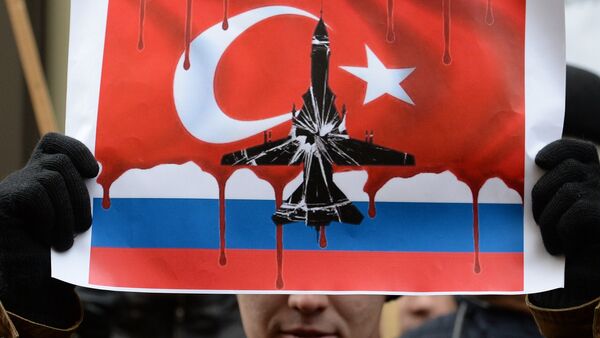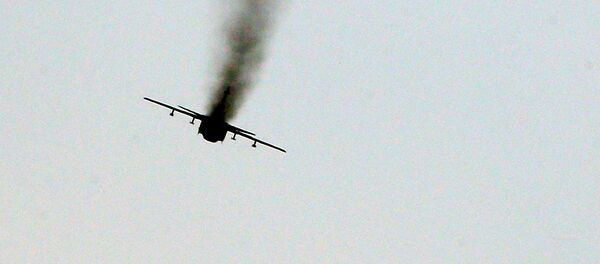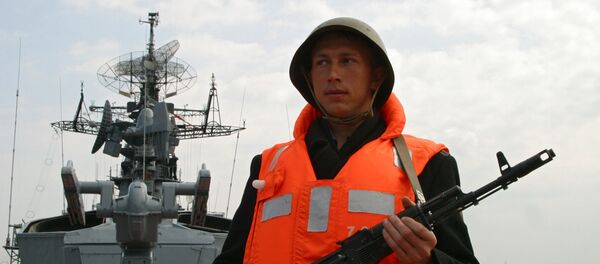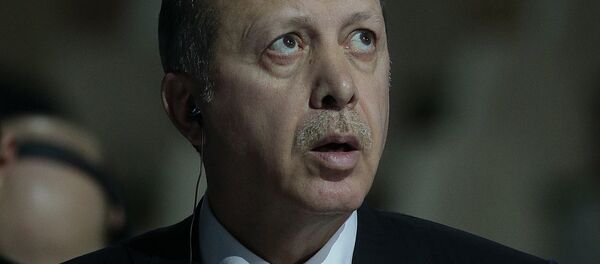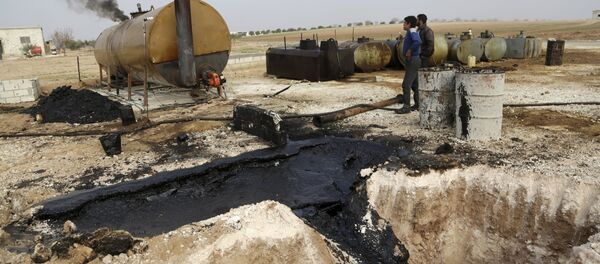MOSCOW (Sputnik) — The move, the effect of which has been multiplied by Ankara’s refusal to acknowledge any wrongdoing, evoked a negative reaction from Moscow, and led to a significant deterioration in bilateral relations, making a recovery questionable.
Stab in the Back
Early on November 24, a Russian Su-24 jet, which is part of the Russian Combat Air Patrol carrying out anti-terrorist operations in Syria, with two people on board, crashed on the Syrian border with Turkey. Shortly afterward, it was confirmed that the commander of the warplane, Lt. Col. Oleg Peshkov, had been killed when Turkmen rebels who opened fire from ground positions on him as he parachuted from the falling plane, while a Russian naval infantry soldier was killed when the Mi-8 helicopter he was traveling on made a forced landing during the operation to rescue the two ejected Su-24 pilots.
Ankara claims it downed the Russian plane because it violated Turkish airspace, having repeatedly warned the Russian crew before firing.
Both Syrian and Russian military officials confirmed that the Su-24 never crossed into Turkish airspace and was illegally downed. In a statement following the incident, Lt. Gen. Sergey Rudskoy, chief of the Main Operational Directorate of the General Staff of the Russian Armed Forces said no attempts were made on the part of the Turkish plane to establish contacts with the Su-24 crew.
Russian President Vladimir Putin said that the plane was downed by an air-to-air missile launched by a Turkish F-16 jet over Syria, ultimately crashing 4 kilometers (2.5 miles) from the Turkish border. He described the downing of the aircraft as "a stab in the back" performed by "accomplices of terrorists."
"This event goes beyond the fight against terrorism. Of course, our servicemen are engaged in a heroic struggle against terrorism, not sparing themselves or their own lives. But today's loss is related to a stab in the back, carried out against us by accomplices of terrorists. I cannot escribe what happened today in any other way," Putin said just hours after the incident.
While asserting its right to respond to "life and security concerns," the Turkish side seemed to have forgotten that it itself has repeatedly violated the airspace of its neighbors, illegally intruding into Greek airspace 2,244 times in 2014, according to statistics compiled by Christos Kollias, a Greek defense economist at the University of Thessaly.
On November 25, Turkish Prime Minister Ahmet Davutoglu said that he gave the order to down the Russian plane, reiterating the claim that the jet had failed to react to warnings to leave Turkish airspace.
Moscow expected Turkey to apologize for the incident but Ankara has instead continued to justify its decision to bring down the Russian jet.
"The protection of our airspace, land border is not only a right but a duty for my government. And no Turkish prime minister or president or authority will apologize because of committing, because of doing our duty," Davutoglu said just several days after the Su-24 downing, during a joint press conference with NATO Chief Jens Stoltenberg.
A pre-planned Attack
Describing the lead up to the downing, Russian Aerospace Forces Commander Col. Gen. Viktor Bondarev said, in late November, that a pair of Russian Su-24 aircraft had been ambushed by Turkish F-16 fighter jets in the attack on November 24 that destroyed one of the Russian warplanes.
"The radar surveillance data confirms that two F-16 fighter jets were patrolling the flight zone for an hour and 45 minutes at an altitude of 2,400 meters [some 7,800 feet], which indicated that this was a deliberate action and their readiness to attack from a position of cover over the Turkish territory," Bondarev told reporters in Moscow.
"The method by which the F-16 aircraft was guided directly into an effective engagement zone, and not along the pursuit course curve, shows that the fighter jet was being directed from a ground control station," Bondarev explained.
The actions of the Turkish jet after the missile had been fired, making an accelerated turn toward the lower margin of the air defense detection area, with a resultant loss of altitude, also point to the planned nature of the attack carried out by the Turkish crew, he added.
Despite Turkey’s vehement claims that it issued numerous warnings to the Russian warplane and even the subsequent media reports of a barely audible audio recording of alleged radio contact between the F-16 fighter and the downed Russian jet, Russia's Aerospace Forces commander stated that the Russian airbase in Syria recorded no warnings coming from a Turkish fighter.
In late December, Russian Defense Ministry spokesman Igor Konoshenkov said Ankara had effectively admitted that the attack on the Russian warplane was pre-planned when Turkish officials released a statement containing precise information on every Russian sortie in Syria. The statement circulated in Turkish media was reportedly made by Deputy Prime Ministe Numan Kurtulmus.
Souring Relations
Following the Su-24 downing, Turkey’s military attache in Moscow was summoned to the Russian Defense Ministry but the incident has not been settled.
Kremlin spokesman Dmitry Peskov said there was no direct Moscow-Ankara dialogue on the issue on the day the tragedy happened.
Later on, Russian Foreign Minister Sergei Lavrov held a telephone conversation with his Turkish counterpart Mevlut Cavusoglu to discuss the Russian aircraft downing, but declined several proposals to hold a personal bilateral meeting.
Lavrov also canceled his scheduled November 25 visit to Turkey, which was expected to focus on counterterrorism efforts and the ongoing Syrian civil war. A December Russia-Turkey summit in St. Petersburg was crossed off the agenda as well.
The Russian Foreign Ministry outlined its position that it did not want to artificially create problems in mutual economic ties, however, Turkey had shown little practical interest in de-escalating tensions between the two countries.
"As for the current stage of our relations and the agreements reached with the Turkish government…. We will seriously reevaluate and rethink everything that is happening in our relationship, in the wake of the attack on our aircraft," Lavrov highlighted.
Hiding Behind NATO
Turkey’s very first step after the incident involving the Russian frontline bomber, was to call an emergency meeting of NATO's decision-making body, the North Atlantic Council (NAC).
The Su-24 incident, marked the first time a NATO member had fired at a Russian aircraft in six decades.
The international community should "avoid accidents that spiral out of control," he warned, adding he concurred with Turkey's version of events.
Moscow, in turn, said that it had not expected NATO to be unbiased in its assessment of the incident. "I do not think we can expect [our] NATO colleagues to be impartial – they will certainly side with Turkey which is their ally." Russian Deputy Foreign Minister Sergei Ryabkov said.
Russia’s NATO envoy, Aleksandr Grushko, noted that by refusing to defining a clear position on Turkey’s downing of the Russian warplane, and instead providing Ankara with political backing, NATO’s leadership had in effect assumed shared responsibility for the incident.
"NATO prefers not to go into detail on the reason for Turkey’s decision to launch a missile to down a plane which was flying in Syrian airspace and which posed no threat to Turkey," Russia’s permanent representative to NATO said, adding that Turkey’s decision to down a non-hostile plane in a border region ran counter to the alliance’s rules of engagement.
Bolstered by the moral support from NATO, Ankara continued to insist that the Russian Su-24 frontline bomber had violated Turkish airspace for "17 seconds," and had repeatedly been warned before the missile was fired.
Instead of condemning Turkey’s act as outrageous, the NATO foreign ministers agreed at an early December meeting in Brussels to continue developing measures to "assure Turkey’s security."
The measures proposed in Brussels included boosting NATO’s Combat Air Patrol at the Incirlik Air Base in Turkey, deploying additional missile defense batteries in the country and sending additional warships to the NATO fleet in the eastern Mediterranean.
The Russian president in response said that Ankara should have immediately apologized for causing the death of a Russian pilot in the incident, instead of "hiding behind NATO."
Down But Not Out
Just weeks after the Su-24 incident, Moscow halted the negotiations on one of the most anticipated Russia-Turkey projects, the Turkish Stream pipeline, which was due to replace the canceled South Stream pipeline initiative.
The Turkish Stream was supposed to run beneath the Black Sea from Russia to Turkey. A gas hub on the Greek-Turkish border was expected to receive an annual 47 billion cubic meters of gas, while the full capacity of the pipeline would total 63 billion cubic meters.
The postponed project had run into difficulties from the outset, with every aspect of the project, including the route and the gas price discount, took great effort to be agreed. The route was approved in February, and by August the sides confirmed that a discount agreement had been reached.
Ahead of the chill in Russia-Turkey relations, Moscow hoped to sign the final agreement on Turkish Stream by the end of the year or in early 2016, insisting on the pipeline deal and discount being sealed simultaneously.
The Su-24 incident also cast doubt on the development of the $20-billion joint Akkuyu Nuclear Power Plant (NPP) project, scheduled to become fully operational in 2022. However, a source familiar with the situation told RIA Novosti in early December that the construction of the Akkuyu NPP’s facilities are continuing despite the tensions between the two countries.
There were no reasons to halt the Akkuyu project despite the strained bilateral relations, Turkish Prime Minister Ahmet Davutoglu said, whose statement was later confirmed by the Russian president.
"A decision on the future of this project must be made at a corporate level. It is a purely commercial issue, and we shall not make a single step which would harm our economic interests," Putin explained.
Economic Restrictions
On November 28, the Russian president signed a decree, due to take effect on January 1, 2016, to ensure national security, protect Russian citizens against criminal and other illegal acts and introduce economic measures against Ankara in retaliation for the plane’s downing.
The ban features a list of foodstuff and other agriculture imports from Turkey, including a wide range of fruit and vegetables, such as tomatoes, onions, cabbage, broccoli, cucumbers, oranges, mandarins, grapes, apples, pears, apricots, peaches, plums and strawberries. Salt, poultry products such as chicken and turkey, and fresh carnations also figure on the list.
The decree included curbs on the employment of Turkish citizens by Russian employers, but the restrictions on work visas will not apply to certain construction companies with long-term contracts in Russia.
Moscow has also suspended its visa-free travel arrangement with Turkey, effective from January 1, and has asked travel agencies in Russia to refrain from selling package tours to Turkey.
Russia used to be one of Turkey’s biggest sources of tourists, but following the Su-24 incident, Russian citizens have lost interest in visiting resorts in the country, a poll conducted by the Russian Public Opinion Research Center (WCIOM) showed, with over 90 percent of respondents not planning to travel to Turkey on vacation.
Ankara responded by saying that it was working on a plan to offset the decline in tourists from Russia, including by allocating more federal funds to subsidize the fuel costs for flying vacationers to Turkish resorts.
Russia’s Education and Sciences Ministry also announced that Russian foreign exchange students studying in Turkey would be returned to Russia as soon as possible.
Russian Prime Minister Dmitry Medvedev said that the restrictions would have a heavy toll on the Turkish economy, while the fallout effect on Russia would be very limited.
The head of Russia’s upper-house of parliament’s International Committee, Alexei Pushkov, said that the rift between Russia and Turkey over the downing of a Russian plane could cost Ankara up to $30 billion in lost potential earnings.
Meanwhile, Turkey’s official estimate was more than half the Russian figure, assessing the damage to its economy at between $8 and $12.5 billion, noting that the government planned to find alternative export and import markets to minimize the effects of the restrictive measures imposed by Russia.
Oil Smuggling
The data collected by the ministry in the course of its anti-terrorist Russian campaign in Syria revealed that there were three main transportation routes for oil to Turkey from IS-controlled fields, and one of the routes could have been observed by the downed Russian Su-24 jet.
"There is a team of militants and Turkish elites stealing oil from their neighbors. This oil…. flows to Turkey on an industrial scale," Russian Deputy Defense Minister Anatoly Antonov said, adding that Turkish President Erdogan Erdogan and his family were directly involved in the illegal oil business conducted by Daesh.
Erdogan responded to the Russian accusations of his family's involvement in IS oil smuggling by claiming he would resign if unequivocal evidence on the matter were found.
According to the Russian defense ministry’s estimates, IS used to earn some $3 million from oil on a daily basis, but the Russian air campaign in Syria had almost halved that revenue stream, which proved the efficiency of the fight against terrorism and illicit oil smuggling.
Moscow stepped up its diplomatic efforts to counter the financing of terrorism through "oil trade, extortion, undetected cash couriers, kidnapping for ransom, trafficking of humans, arms and racketeering" and co-sponsored with Washington a UN Security Council resolution on the issue on December 18. Among other provisions, the resolution seeks to reveal and disrupt illicit oil trade with terrorists.
Nothing to Hide, But Patience Needed
Deciphering of the black box of the downed Su-24 could be instrumental in shedding light on the incident. Russia invited international observers to ensure the objectivity and transparency of the decoding process.
The US-based International Society of Air Safety Investigators (ISASI), in particular, did not have any issues with the quality of Su-24 flight recorder opening process.
As both Russian and international experts opened the black box, they revealed that severe damage to the flight recorder of the downed jet rendered their efforts unsuccessful.
The Russian Defense Ministry confirmed on December 21 that the decoding of the Su-24 "black box" was currently impossible, and would require help from experts and institutions that possess advanced data retrieval and decoding technology.
"Unfortunately, this work will take a rather long time, but we will do everything we can to succeed," Lt. Gen. Sergei Bainetov, head of the Defense Ministry's flight safety department said, forecasting that the deciphering process could take up to six months.
The future of Russian-Turkish relations currently entirely relies on the investigation into the Su-24 downing and Ankara’s efforts to settle the incident.
During his December 17 annual press conference, President Putin said that Russia was ready to work with Turkey on the sensitive issue of the Su-24 incident, but Ankara had not progressed the dialogue, making it difficult to restore the strained relations at present.
